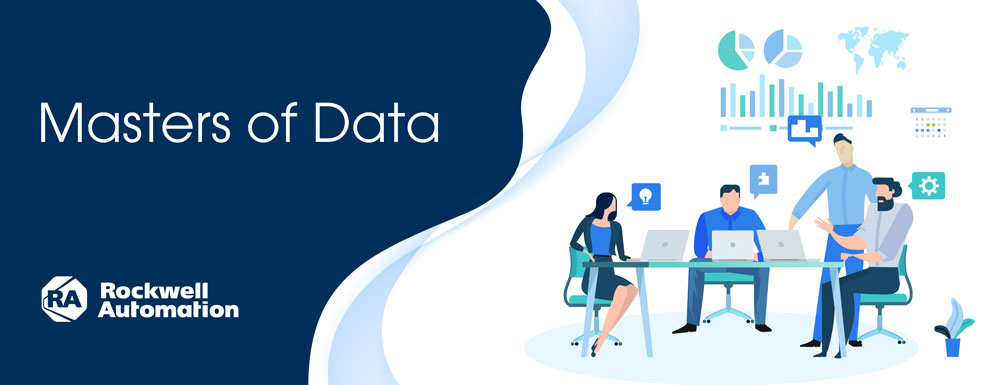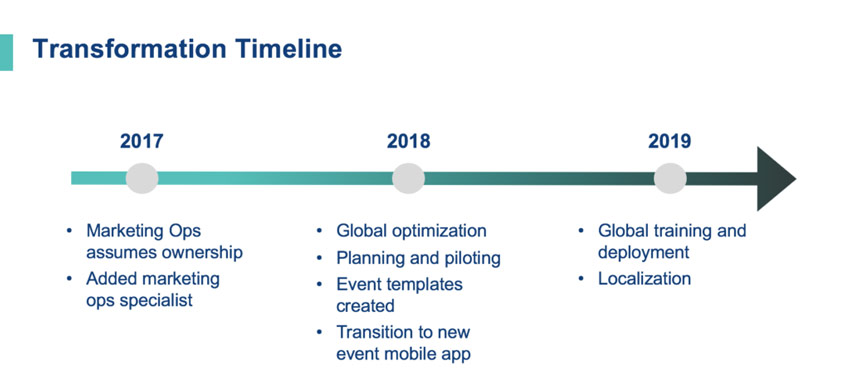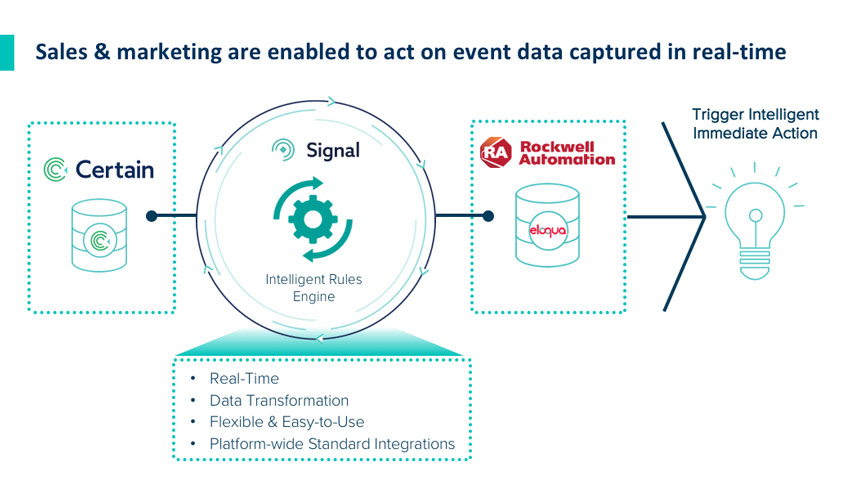As B2B event professionals work to find bold and inspiring new ways to up their attendee experience game in 2019, marketers are fine-tuning their approach to driving these new ideas and tactics on the backend. For marketers, delivering the ultimate attendee experience relies on a comprehensive data strategy. It’s the data, after all, that allows sales and marketing teams to be more personalized in their approach to connecting with both prospects and customers through events. But who takes the lead on managing event data? Who’s running the show when it comes to attendee data collection, navigation and transformation?
Brad West, Global Marketing Technology Manager at Rockwell Automation recently presented his case for why marketing operations teams are in a unique position to take the lead on events. In his presentation at Oracle’s Modern Customer Experience, Masters of Events: How Marketing Ops is Digitally Transforming events, West took attendees through Rockwell’s journey to transform their event data strategy.
Rockwell’s Events Program and Challenges
In-person events are a highly strategic marketing channel for Rockwell Automation, a Fortune 500 provider of industrial automation and information technology. Playing host to over 200 events and over 30,000 event registrants per year—in nine different languages—Rockwell struggled to measure results from their events due to a highly decentralized way of managing their global events. Because each global region was free to choose their own way of managing events, Rockwell was left with fragmented and inconsistent data, leads that weren’t being followed up on, and an inability to measure or deliver ROI.
The Role of Marketing Ops
In their role at Rockwell, West’s Global Marketing Operations team are tasked with operationalizing and optimizing the company’s marketing strategy, process and infrastructure, with the overall goal of increasing and measuring marketing efficiency, effectiveness and business contribution. With the growing role of global events and the challenges that Rockwell was facing, the marketing operations team plays a significant leading role in centralizing the management of events by focusing on the event data strategy and tying activity to revenue.
Playing host to over 200 events and over 30,000 event registrants per year—in nine different languages—Rockwell struggled to measure results from their events due to a highly decentralized way of managing their global events.
Transforming Rockwell’s Approach to Event Data
Understanding how critical it is for sales and marketing to be able to effectively interpret and act on data in real-time, Rockwell implemented Certain Platform and Touchpoint as their go-to event automation and mobile solution. And thus began the transformation…
West and his team started with their global regions to centralize the ownership of event and data management, gaining their buy-in and support by showcasing the increase in results they could expect with a more tightly aligned structure—buoyed by the use of Certain as a single, global platform. They then implemented global standards and governance to ensure consistency across all regions.
West’s team took a hard look at what data they could collect from events that would have the biggest impact on their business. To formulate an event data strategy, they looked at an event across three phases: before the event, during the event, and after the event.
Before the Event – Registration
The transformation began with Rockwell’s event registration forms, where valuable information on attendees is collected from the get-go. Certain’s customizable registration forms enable West and his team to hand-pick what information will be collected to best drive their marketing segmentation and buyer personas, including job function, job level, business type and industry.
Information on company size, revenue range, industry and sub-industry are also included to support ABM targeting and account matching.
During the Event – Real-time Attendee Engagement
During the event, Rockwell’s primary objective is to capture greater data on how attendees are engaging and alert their sales team of any hot leads. The real-time data they are looking to capture and arm their sales and marketing teams with is:
- Event Registration
- Event Attendance
- Session Registration
- Session Attendance
- Event Registration
- Event Attendance
- Event Inquiries
Knowing the importance of following up with leads in a timely manner, West and team worked toward a goal of providing sales with “leads before cocktail hour”.
The next step was to better utilize lead capture and survey capabilities within Touchpoint, Certain’s mobile event app. West and his team made app-based lead capture required, using standard qualifying questions to determine:
- Active Need
- Already talking to sales
- Contact Requested
- Product Interests
- Comments
The data is then sent in real-time to their marketing automation platform (Eloqua), information is scored and validated, then leads are deployed to Rockwell’s CRM.
After the Event – Personalized Follow Up
Once data from events was routed to Eloqua and on to their CRM, Rockwell used the engagement data to personalize follow up. For example, in seeing what sessions a prospect attended, the sales person could offer collateral specific to what was covered in those sessions.
For larger events, Certain Touchpoint allows Rockwell to conduct in-app surveys, capturing event and session feedback that can be tied back to the app user. This is implemented consistently across events to ensure standard measurement and feedback can be obtained. Rockwell uses this feedback to improve upon future sessions and events.
Results of the Transformation:
As a result of West and his team’s efforts to centralize and standardize event and data management globally, Rockwell has seen major operational efficiency improvement including reduced time to set up and execute events via templates. Templates generated in Certain mean a consistent, brand-compliant experience for all Rockwell event attendees across the globe.
Rockwell is now capturing a consistent set of data that delivers results. They’ve automated a number of previously manual processes including event communications (thanking those that attended, “Sorry to miss you” to those that didn’t). This reduction in manual labor has allowed the different regions to focus on higher value activities, such as the content delivered in an event, the creative elements, and ensuring attendees have an incredible experience.
Most importantly, by centralizing the ownership of events and deploying Certain, Rockwell has seen a massive improvement in the quality of leads that have come from events—empowering their sales team to follow up on event leads in real-time through Certain’s data integration platform, Certain Signal.
The efforts of West and his team have undoubtedly paid off for Rockwell. Global teams now trust the system and process in place, and they have managed to not only increase productivity, but also to reduce spend and dependency on third parties.
—
Marketers concerned with creating the ultimate attendee experience are getting smarter about employing a comprehensive data strategy as the undercurrent of their events, in order to both leave lasting impressions and deliver results. With Certain’s end-to-end suite of event automation products, businesses are equipped to transform actionable intent data from events into measurable business outcomes. Contact us to learn more about how to put your event data into action.


